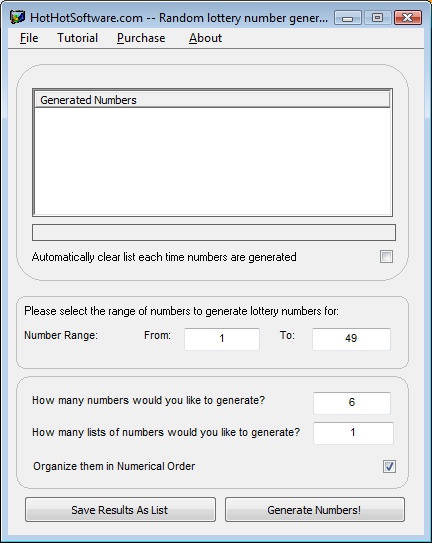
Generate a 6 digit PIN without duplicates Example: Randomize a Set of Numbers To generate a 6-digit PIN with or without duplicate digits choose the following settings: You can also order your random numbers ascending, lowest to highest or descending, highest to lowest.ĭo you need to include random numbers and letters in a random character set? See the CalculatorSoup ® Random Number and Letter Set Generator.Įxample: Generate a Random Number to Use as a PIN. Sort numbers? You can decide not to sort your random numbers.
#RANDOM LIST GENERATOR 1 THROUGH 7 GENERATOR#
If you choose Yes the random number generator may produce a duplicate number in your set of numbers. Allow repeats? If you choose No your random numbers will be unique and there is no chance of getting a duplicate number.How many numbers? Specify how many random numbers to generate.

The random number(s) generated are selected from your range of numbers, with the min and max numbers included. What is your range? Set a minimum number and a maximum number.This calculator uses a randomizing computer program to produce random numbers, so it is a pseudo-random number generator. A true random number generator receives information from these types of unpredictable events to produce a truly random number. Examples of such events are blips in atmospheric noise, or points at which a radioactive material decays. In other words, randomness from a computer program is not necessarily an organic, truly random event.Ī true random number generator (TRNG) relies on randomness from a physical event that is external to the computer and its operating system. These random number generators are pseudo-random because the computer program or algorithm may have unintended selection bias. There are two main types of random number generators: pseudo-random and true random.Ī pseudo-random number generator (PRNG) is typically programmed using a randomizing math function to select a "random" number within a set range. Generate positive or negative random numbers with repeats or no repeats. mentions this module showing one integer.Generate one or more random numbers in your custom range from 0 to 10,000. > np.random.lognormal(mean=0.0, sigma=1.0, size=size).astype(int)ġNamely Lawrence Aspden, T Mohammed, et al. > np.random.poisson(lam=1, size=size).astype(int)

#RANDOM LIST GENERATOR 1 THROUGH 7 HOW TO#
Some posts demonstrate how to natively generate multiple random integers. How can I generate random integers between 0 and 9 (inclusive) in Python?įor clarity, here we demonstrate how to get multiple random integers.

While many posts demonstrate how to get one random integer, the original question asks how to generate random integer s (plural): This will give you a numpy array of length = 15. of 7 runs, 100000 loops each)ġ.> np.random.randint generates random integers over the half-open interval [low, high).Ģ.> np.random.uniform generates uniformly distributed numbers over the half-open interval [low, high).ģ.> np.random.choice generates a random sample over the half-open interval [low, high) as if the argument a was np.arange(n).Ĥ.> random.randrange(stop) generates a random number from range(start, stop, step).ĥ.> random.randint(a, b) returns a random integer N such that a astype(int) casts the numpy array to int data type.ħ.> I have chosen size = (15,). ► np.random.uniform and np.random.randint are much faster (~10 times faster) than np.random.choice, random.randrange, random.randint. > ĥ.> random.randint from random import randint X2 = np.random.uniform(low=0, high=10, size=(15,)).astype(int)ģ.> import numpy as npĤ.> random.randrange from random import randrange


 0 kommentar(er)
0 kommentar(er)
